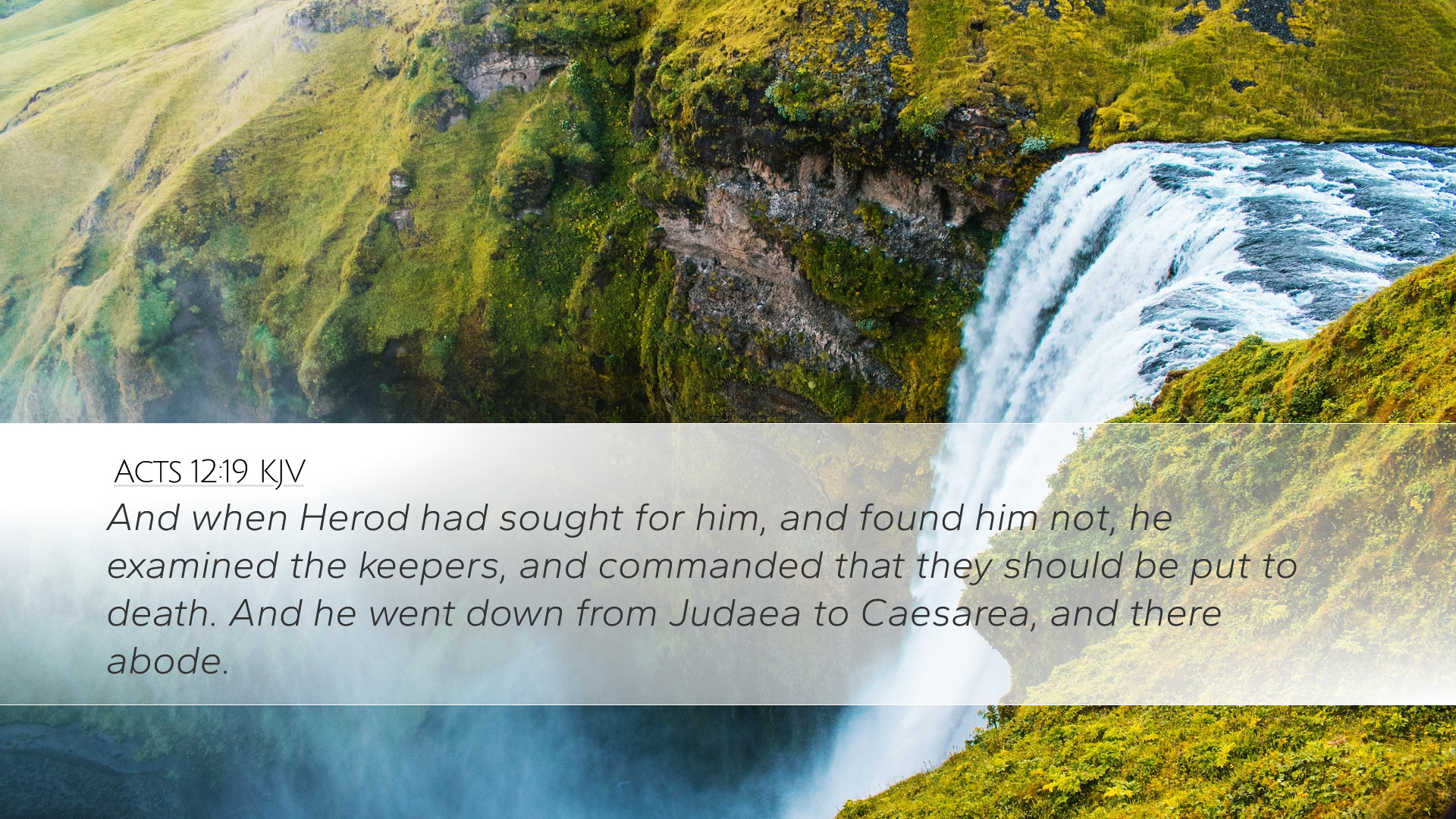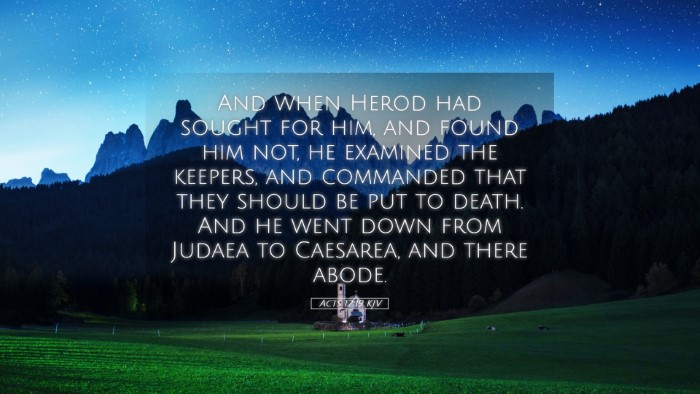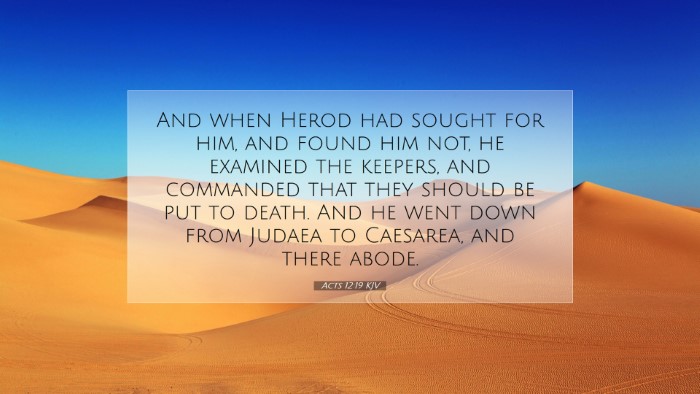Old Testament
Genesis Exodus Leviticus Numbers Deuteronomy Joshua Judges Ruth 1 Samuel 2 Samuel 1 Kings 2 Kings 1 Chronicles 2 Chronicles Ezra Nehemiah Esther Job Psalms Proverbs Ecclesiastes Song of Solomon Isaiah Jeremiah Lamentations Ezekiel Daniel Hosea Joel Amos Obadiah Jonah Micah Nahum Habakkuk Zephaniah Haggai Zechariah MalachiActs 12:19
Acts 12:19 KJV
And when Herod had sought for him, and found him not, he examined the keepers, and commanded that they should be put to death. And he went down from Judaea to Caesarea, and there abode.
Acts 12:19 Bible Commentary
Commentary on Acts 12:19
Acts 12:19 states: “And when Herod had sought for him, and found him not, he examined the keepers, and commanded that they should be put to death. And he went down from Judea to Caesarea, and there abode.” This verse occurs in a context that is both dramatic and significant within the narrative of the early church. Below, we explore insights drawn from the commentaries of Matthew Henry, Albert Barnes, and Adam Clarke, emphasizing its theological and historical implications.
Contextual Background
Acts 12 details the persecution of the church under King Herod Agrippa I, who sought to please the Jews by persecuting the followers of Christ. This chapter encompasses Peter's imprisonment and miraculous escape, setting the stage for Herod's subsequent actions.
Insights from Matthew Henry
Matthew Henry provides a comprehensive examination of this passage, emphasizing the following points:
- The Failure of Herod: Henry notes that Herod's meticulous search for Peter signifies his desperation and the futility of his attempts to thwart God's plans. Despite his authority, Herod could not control the supernatural intervention that freed the apostle.
- Judgment upon the Guards: The execution of the guards illustrates the severity with which Herod dealt with his own incompetence. Henry posits that this act reflects the cruelty often exhibited by tyrants under immense pressure.
- Herod's Retreat: After the failed apprehension of Peter, Herod's withdrawal to Caesarea indicates a change of strategy. In this moment, Henry interprets it as a divinely orchestrated retreat, highlighting the transient nature of human power compared to divine providence.
Insights from Albert Barnes
Albert Barnes offers critical insights, particularly regarding the implications of Herod's actions:
- Explore the Meaning of ‘Examined’: Barnes points out that Herod’s examination of the guards was not merely procedural but laden with anger and a deep desire to maintain his image of control over the situation.
- Cultural Context: He emphasizes the cultural weight of Herod’s decision to execute the guards as a reflection of Roman justice, where failure was met with severe repercussions. This deepens our understanding of the political context in which early Christians existed.
- Death of the Guards and Implications: Barnes interprets the guards’ death as both a literal punishment and as a symbol of the ultimate futility of resisting God's purposes. The fate of the guards epitomizes the idea that earthly power cannot prevail against divine will.
Insights from Adam Clarke
Adam Clarke's extensive commentary focuses on the broader implications of the narrative:
- Historical Significance: Clarke underscores the historical consequences of Herod's decisions, arguing that this incident marked a significant turning point in Christian history where divine assistance became more apparent in the face of oppression.
- Response to Persecution: He expounds on the theme of persecution and divine deliverance. Clarke sees Peter's escape as emblematic of God's providence and the burgeoning strength of the early church in adversity.
- Herod's Character Study: Clarke emphasizes Herod's character, portraying him as a tyrant reveling in human power. This characterization serves as a reminder of the moral lessons pertinent to leadership and accountability.
Theological Reflections
This verse and its analysis provide several theological reflections useful for pastors, students, theologians, and Bible scholars:
- Divine Sovereignty vs. Human Authority: The interplay between Herod’s actions and divine intervention invites deeper study into the nature of God’s sovereignty. It serves as a reaffirmation that, despite human plans, divine purpose prevails.
- Human Consequences of Sin: The story emphasizes the rampant consequences of sin and pride, as seen in Herod's life, reminding believers of the shadow of mortality that hangs over unrepentant rulers and leaders.
- Encouragement in Persecution: For contemporary believers, the message is clear: God remains in control even when worldly powers seemingly prevail. This empowers Christians today who feel economically and socially marginalized.
Conclusion
Acts 12:19 is not simply an account of a failed search for an apostle; it encapsulates the broader struggle between the Kingdom of God and earthly powers. The insights from Matthew Henry, Albert Barnes, and Adam Clarke reveal a multifaceted narrative that invites continual reflection on God’s providence, the consequences of sin, and the nature of true authority. As we engage with this text, let us remember to approach the sovereignty of God with reverence, acknowledging that no earthly king can escape the overarching rule of Almighty God.


